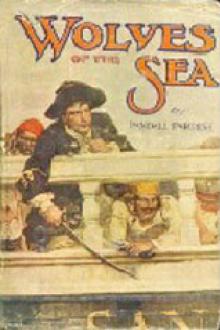Genre Adventures. Page - 2

g, and the two mates having their hands full in driving forward the work of finishing the lading, so that the hatches might be on and things in some sort of order before the crew should be needed to make sail.
The decks everywhere were littered with the stuff put aboard from the lighter that left the brig just before I reached her, and the huddle and confusion showed that the transfer must have been made in a tearing hurry. Many of the boxes gave no hint of what was inside of them; but a good deal of the stuff--as the pigs of lead and cans of powder, the many five-gallon kegs of spirits, the boxes of fixed ammunition, the cases of arms, and so on--evidently was regular West Coast "trade." And all of it was jumbled together just as it had been tumbled aboard.
I was surprised by our starting with the brig in such a mess--until it occurred to me that the captain had no choice in the matter if he wanted to save the tide. Very likely the tide did enter into his calculations; but I was led to believe

the go-horse was in position, and thus steadied it admirably with this hint taken direct from the workmanship of the Great Carpenter.
There came a day when the horse was finished and the last coat of paint had dried smooth and hard. That evening, when Nebby came running to meet Zacchy, he was aware of his Grandfather's voice in the dusk, shouting:--"Whoa, Mare! Whoa, Mare!" followed immediately by the cracking of a whip.
Nebby shrilled out a call, and raced on, mad with excitement, towards the noise. He knew instantly that at last Granfer had managed to catch one of the wily Sea-Horses. Presumably the creature was somewhat intractable; for when Nebby arrived, he found the burly form of Granfer straining back tremendously upon stout reins, which Nebby saw vaguely in the dusk were attached to a squat, black monster:--
"Whoa, Mare!" roared Granfer, and lashed the air furiously with his whip. Nebby shrieked delight, and ran round and round, whilst Granfer struggled with the animal.
"H

topped more than once, and, loitering along, it was dark when they neared their destination.
As they would have drawn up to the wharf there was a sudden flash of light--gone in a moment--followed by a dark body that swished by them like a flash.
Frank uttered an exclamation of astonishment.
"See that?" he demanded.
"Yes. What could it have been?"
"You've got me, but it's heading toward the open sea. Great Scott! Maybe it's an enemy."
"An enemy?"
"Yes; you know how anxious the Germans are over this submarine business. Maybe this fellow has been spying about. May be going to report to a German submarine out there some place."
"Think we had better follow and have a look?" asked Jack.
"Believe it would be a good idea. Let's go."
Without another word, Jack brought the boat about and headed after the one that had so recently dashed by them. In the darkness ahead there was nothing to be seen.
"Like looking for a needle in a haystack," Jack

an air of good-humoured sang froid which was peculiar to him, Foster said--
"Captain, don't you think I've had these bits of rope-yarn on my wrists long enough? I'm not used, you see, to walking the deck without the use of my hands; and a heavy lurch, as like as not, would send me slap into the lee scuppers--sailor though I be. Besides, I won't jump overboard without leave, you may rely upon that. Neither will I attempt, single-handed, to fight your whole crew, so you needn't be afraid."
The stern Moor evidently understood part of this speech, and he was so tickled with the last remark that his habitual gravity gave place to the faintest flicker of a smile, while a twinkle gleamed for a moment in his eye. Only for a moment, however. Pointing over the side, he bade his prisoner "look."
Foster looked, and beheld in the far distance a three-masted vessel that seemed to bear a strong resemblance to a British man-of-war.
"You promise," said the captain, "not shout or ro-ar."

es that they have something like a quarter of a million dollars buried in tin cans among the brush over there now--"
"It is their form of stocking," put in Charlie Webster.
"Precisely. Well, as I was saying, those old fellows would bury their hoards in some cave or other, and then go off--and get hanged. Their ghosts perhaps came back. The darkies have lots of ghost-tales about them. But their money is still here, lots of it, you bet your life."
"Do they ever make any finds?" I asked.
"Nothing big that I know of. A jug full of old coins now and then. I found one a year or two ago in my garden here--buried down among the roots of that old fig tree."
"Then," put in Charlie, "there was that mysterious stranger over at North Cay. He's supposed to have got away with quite a pile."
"Tell me about him," said I.
"Well, there used to be an old eccentric character in the town here--a half-breed by the name of Andrews. John will remember him--"
John nodded.

e temper and disposition of your child may be affected by the nourishment it receives, I think it more likely to be injured by the milk of a married woman who will desert her own child for the sake of gain. The misfortune which has happened to this young woman is not always a proof of a bad heart, but of strong attachment, and the overweening confidence of simplicity."
"You are correct, Doctor," replied Mr Easy, "and her head proves that she is a modest young woman, with strong religious feeling, kindness of disposition, and every other requisite."
"The head may prove it all for what I know, Mr Easy, but her conduct tells another tale."
"She is well fitted for the situation, ma'am," continued the Doctor.
"And if you please, ma'am," rejoined Sarah, "it was such a little one."
"Shall I try the baby, ma'am?" said the monthly nurse, who had listened in silence. "It is fretting so, poor thing, and has its dear little fist right down its throat."
Dr Middleton gave the signa

on. Theshuffling of feet, the rattling of chains, the harsh voices of theguard, made it impossible to distinguish any words passing between thetwo. I could only watch them, quickly assured that I had likewiseattracted the girl's attention, and that her gaze occasionally soughtmine. Then the guards came to me, and, with my limbs freed of fetters,I was passed down the steep ladder into the semi-darkness betweendecks, where we were to be confined. The haunting memory of her faceaccompanied me below, already so clearly defined as to beunforgettable.
It proved a dismal, crowded hole in which we were quartered like somany cattle, it being merely a small space forward, hastily boxed offby rough lumber, the sides and ends built up into tiers of bunks, theonly ventilation and light furnished by the open hatch above. Theplace was clean enough, being newly fitted for the purpose, but wastotally devoid of furnishings, the only concession to comfort visiblewas a handful of fresh straw in each bunk. The m

that Christmas morning, the road which skirts the seashore from St. Peter's Port to the Vale was clothed in white. From midnight till the break of day the snow had been falling. Towards nine o'clock, a little after the rising of the wintry sun, as it was too early yet for the Church of England folks to go to St. Sampson's, or for the Wesleyans to repair to Eldad Chapel, the road was almost deserted. Throughout that portion of the highway which separates the first from the second tower, only three foot-passengers could be seen. These were a child, a man, and a woman. Walking at a distance from each other, these wayfarers had no visible connection. The child, a boy of about eight years old, had stopped, and was looking curiously at the wintry scene. The man walked behind the woman, at a distance of about a hundred paces. Like her he was coming from the direction of the church of St. Sampson. The appearance of the man, who was still young, was something between that of a workman and a sailor. He wore his workin

s well to be on the safe side, sir," replied Tom.
"Safe side!" repeated the captain, laughing. "You'd guard against asun-stroke, with that old hat, in an Ice Pack. Wa'al! What haveyou made out at the Post-office?"
"It is the Post-office, sir."
"What's the Post-office?" said the captain.
"The name, sir. The name keeps the Post-office."
"A coincidence!" said the captain. "A lucky bit! Show me where itis. Good-bye, shipmates, for the present! I shall come and haveanother look at you, afore I leave, this afternoon."
This was addressed to all there, but especially the young fisherman;so all there acknowledged it, but especially the young fisherman."He's a sailor!" said one to another, as they looked after thecaptain moving away. That he was; and so outspeaking was the sailorin him, that although his dress had nothing nautical about it, withthe single exception of its colour, but was a suit of a shore-goingshape and form, too long in the sleeves and too short in the legs,and to

culiar difficulties and dangers in it, a long way over and above those which attend all voyages. It must not be supposed that I was afraid to face them; but, in my opinion a man has no manly motive or sustainment in his own breast for facing dangers, unless he has well considered what they are, and is able quietly to say to himself, "None of these perils can now take me by surprise; I shall know what to do for the best in any of them; all the rest lies in the higher and greater hands to which I humbly commit myself." On this principle I have so attentively considered (regarding it as my duty) all the hazards I have ever been able to think of, in the ordinary way of storm, shipwreck, and fire at sea, that I hope I should be prepared to do, in any of those cases, whatever could be done, to save the lives intrusted to my charge.
As I was thoughtful, my good friend proposed that he should leave me to walk there as long as I liked, and that I should dine with him by-and-by at his club in Pall Mall. I accept